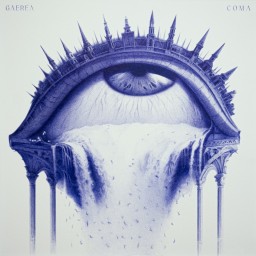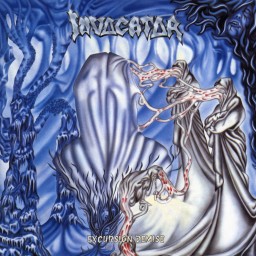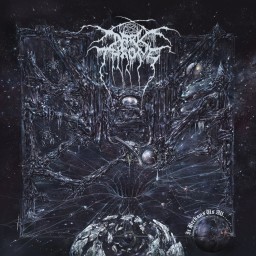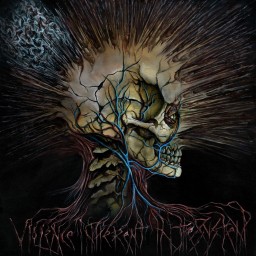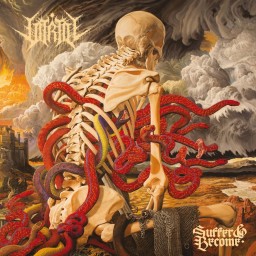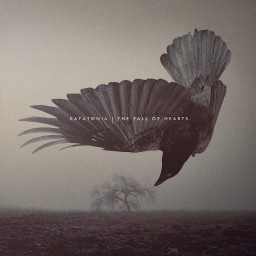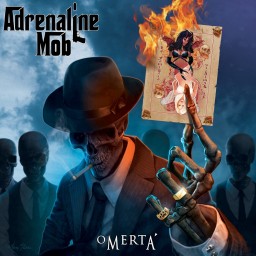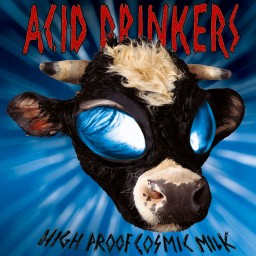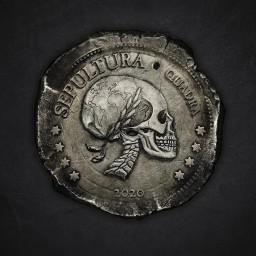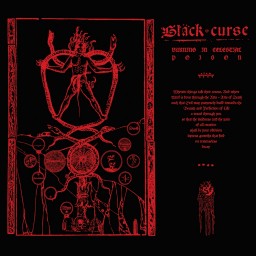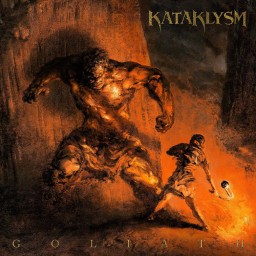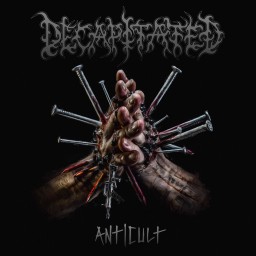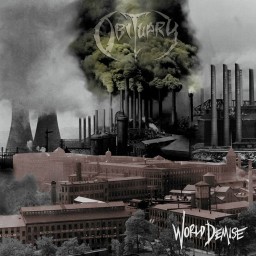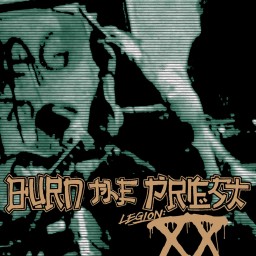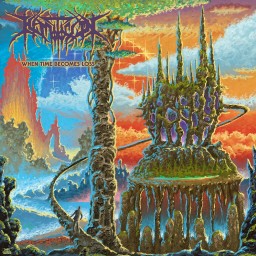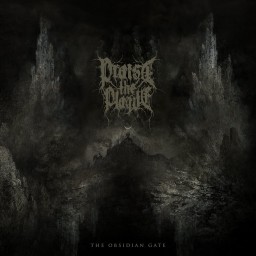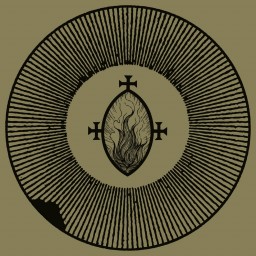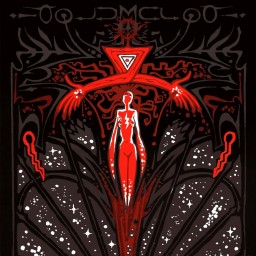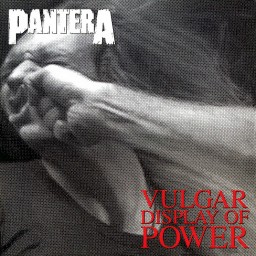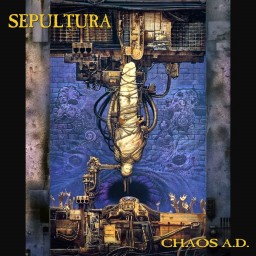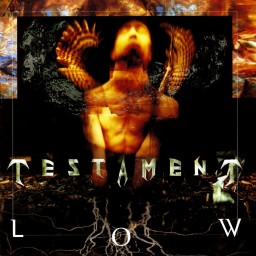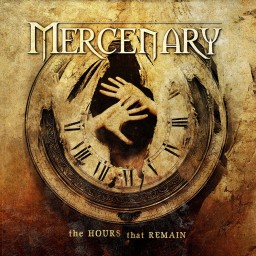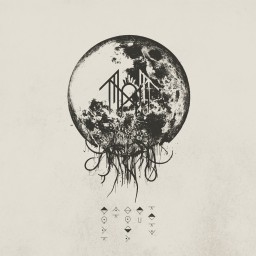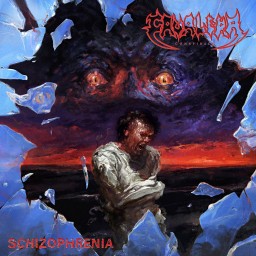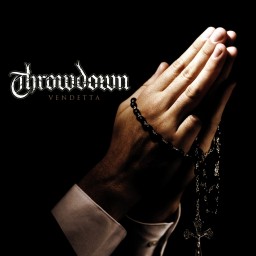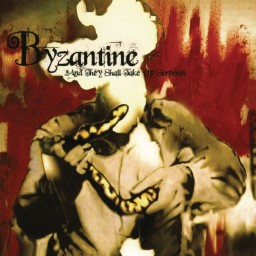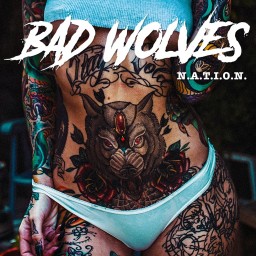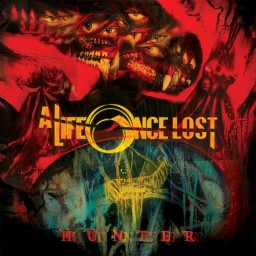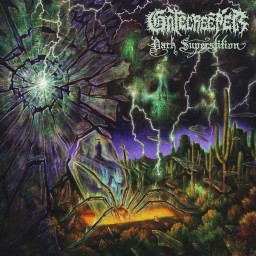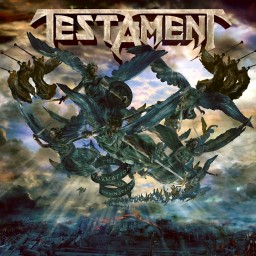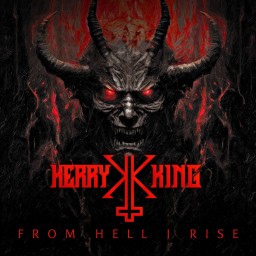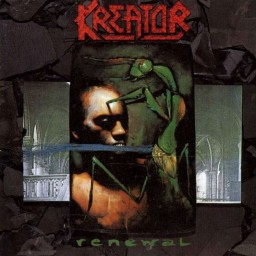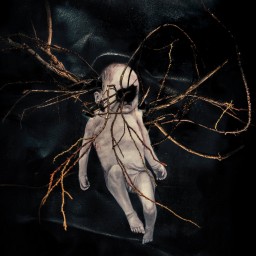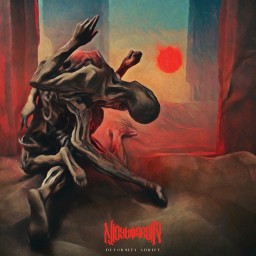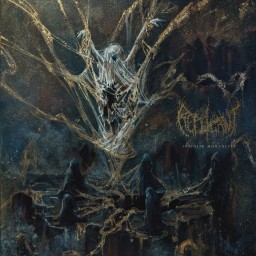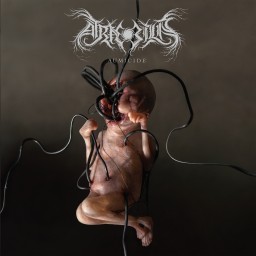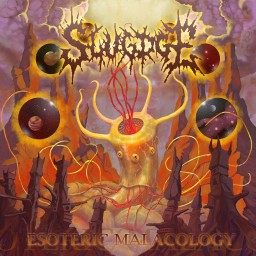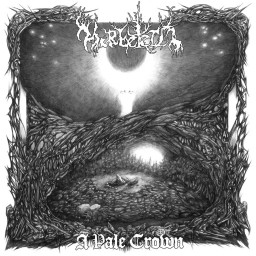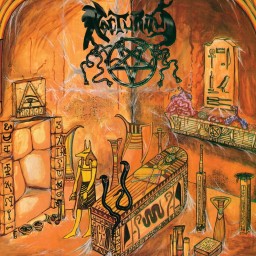Vinny's Reviews
Having been a one time elitist, “all core is shit” type (until a few years of MA was under my belt at least), the metalcore world still occupies a very rare level of content in my listening habits. On paper at least, metalcore should not be that alien a concept to me. That combination of hardcore punk and the extreme elements of metal is a sum that I should have no problem with the outcome of. I don’t mind hardcore punk and I obviously love me some extreme metal. However, I think that true combination is not there in most of what I hear from the sub-genre, all too often getting infused with other elements that aren’t necessarily as advertised. Enter Sorcerer’s 2024 album, Devotion. This absolutely fits the above described blueprint perfectly.
Sorcerer are angry. Not “my Mom took my Game Boy off me because I called her fat” angry though. More of a gnarly level of pissed off that wouldn’t sound out of place on an Agnostic Front record. Devotion is a real middle finger to the world type of album that certainly gets things off its chest whilst still deploying a strong ear for melody and pacing as it goes along. Simply put, I could put Devotion on all day (in the right mood) and not need to change the record. It possesses a level of angst that somehow is not intrusive, a sort of “getting on with it in the background whilst I do my ironing” kind of vibe. Occasionally I am more engaged with it more than I am others because I too hate relationships/people in general (for example). As it stands Devotion has been on everyday for about three weeks. In the car, on the beanie earphones whilst in bed, in the office whilst I continue to battle the corporate monstrosity that I work for and even whilst gaming of late (this would make a healthy addition to the radio in GTA in particular I think).
My (largely untrained) ear picks up elements of Converge (whose You Fail Me album got a revisit off the back of listening to this Sorcerer record) and I am also reminded a lot of the gnarlier aspects of some crossover thrash that I have heard over the years also. The energy levels are high for pretty much all of the record yet as I mentioned above, there is some care, some level of thought and attention to Devotion also. Closing track Someone Else’s Skin, for example, starts off with a scathing almost bm tremolo sounding riff before veering into more familiar punk territory, settling into those crossover moments nicely again for me. However, by the end of the track we have gone through some almost tender moments of reflection and contemplation, giving the track a real wholesome feel. The photograph on the cover of the album is probably one of the best representations of what actually lies beneath. Battle-hardened, wounded and ugly as fuck music with the tenderness of those tears on the soldiers face suggesting the depth I have been able to describe.
Genres: Metalcore
Format: Album
Year: 2024
Following on from the success of Limbo, Portuguese black metallers, Gaerea continued that rich vein of form into Mirage some two years later, with the latter release achieving a full, five-star rating from me in 2022. Pipped to the post of AOTY for that year only by the might Messa with Close, Gaerea continued to show a great panache for performing some richly melodic and yet intensely focused black metal, even landing them the title of my favourite modern black metal band. Somehow during 2024 I lost complete track of the band and I subsequently missed Coma being released altogether. I do recall hearing the single, World Ablaze however and feeling underwhelmed which may have subconsciously thrown me off the trail of the album.
After a few listens through Coma there are a couple of points of note. The riffs sound like they have more bite than on previous releases and the trill factor of the tremolo seems to have increased also. This seems largely due to the addition of Sonia Schuringa on second guitar after Guilherme Henriques added vocal duties on top of his string responsibilities following the departure of original vocalist Ruben Freitas. The melodies seem to resonate stronger throughout the tracks this time around, creating something of a wall of melody that sits behind the pounding percussion and more aggressive vocal sections.
The change of vocalist has beefed up the sound of Gaerea in some regards, with a death metal style complimenting the blackened intensity of the guitar as well as providing a nice juxtapose to the more clean, post-metal elements. Yet in some way, Coma feels tamer than what has gone before it. It is as if this album is an experiment in to just what direction Gaerea will turn next as their career progresses, exploring those “post” elements whilst dialling up their vocal delivery, certainly hints that creativity flows strongly through the band’s veins. In doing so though, the delivery seems to be off this time around. For me at least, Coma is a frontloaded record. Once I get past the title track at the halfway point, I struggle to remember much of what I hear. I only remember Wilted Flower because it feels one of the most overtly “post” tracks here, with its whispered vocal section drifting dangerously close to “gaze” territory.
None of this makes Coma a bad record. I would argue you would struggle to find as creative and ambitious sounding band in black metal as what I hear over the fifty-minutes run time of this record. Whilst it is too early to be crying phrases such as “identity crisis”, Gaerea are evolving, and the direction might not be for all. For now, there is still enough quality on this album that covers black metal, blackened death and post-metal without alienating me.
Genres: Black Metal
Format: Album
Year: 2024
There is a lot for me to like about Excursion Demise. In theory at least, those clear Demolition Hammer and Dark Angel influences postively kick down the front door as the album announces its own arrival with a an intensity level touching on nuclear. Everything is frenzied more or less from the off (well once the fade up of the intro lapses), and with a vocal style that I always feel sounds like the lyrics are tripping over the music in some clumsy yet somehow with a rhythmic relationship to the music, things look promising for Invocator early on. The drums also show a welcome presence on the opening, title track. Not technical as such, but interesting enough to be able to mix it up whilst hitting a consistent level of power at the same time, against a mix that does not necessarily sound like it wants to help them at all. I am unsure though as to why the band elected to put in a thirty-two second track instead of just using it as an intro to what they bill as track number three, yet to me it is all clearly one track?? It is not a massive issue but is certainly an early annoyance.
Strong start though it has, Excursion Demise suffers badly from a poor production job on the guitars. The riffs are lacking any power in the mix at all, playing at times as if they are black metal riffs, such is their lack of meat. Conversely, the sonic chaos that I would describe the lead work as being offers a much more scathing and memorable experience for me. It is like the guitars got recorded on a different day inside a barrel with just a couple of holes in it, whilst the rest of the instruments and vocals got done in a studio proper. Whlst I can still put the album down as being overall a suitably frenzied and frantic experience for my metal tastes, the rhythm guitar does ultimately detract from my otherwise positive listening experience here. Only on the excellent The Persistance from Memorial Chasm comes close to being able to overcome these production struggles but if ever there was a case for a remix of an album, Excursion Demise is top of the list in my book.
Still, for me to find an album of this style from the 90's that I had never heard of before (although I recognise their sophomore, Weave the Apocalypse from programming the playlist) is a good enough treat. There are not many albums of this intensity that I discover on a frequent basis. Just as I thought I had swept the decks clean of most decent thrash metal releases from back in the day, Ben churns one up as a feature release to keep me on my toes. I just wish the quality of the production, matched the quality of the music. Whether a conscious effort or not (I doubt it was conscious) it is the main thing that keeps Excursion Demise away from the higher scores range.
Genres: Thrash Metal
Format: Album
Year: 1991
Based on Darkthrone’s last three albums, I should love It Beckons Us All. I absolutely lapped up Astral Fortress, Eternal Hails and Old Star, affording two out those three ratings of over four stars. This methodology of what I saw described in one review as “radical egocentrism” or “artistic freedom”, whereby Fenriz and Ted just do whatever the fuck they like has served them well in my book. It has produced some earthy sounding metal that stands out in the modern era like a sore thumb when compared to the more polished elements of metal music nowadays. For the record, I have no problem with any degree of egocentrism if produces true sounding music like Darkthrone have done over the last five years or so.
I recall that I may even have gone as far as to suggest that I may like modern Darkthrone more than I do the early black metal incarnation of the band. In terms of memorability, the last three albums shade most of the early-mid 90’s stuff for me, even if there is an argument to say the quality has dipped over recent years (and of course there is an element to say that it is supposed to have dipped). The fact is though, my love affair with latter day Darkthrone has come to an end with It Beckons Us All. Despite multiple listens and an acknowledgement that there is nothing far removed from previous releases on this latest offering, I just cannot get into the record. Perhaps there is something to be said for continuing to tread a well-trodden path before the scenery goes from being interesting to just lots and lots of fields – although that does not feel like a fair reflection of the sound of the album.
I can hear all the riffs in here that virtually infect your brain from the start of the record. That familiar crusty edge to things still retains enough cvlt points to keep the tracks constantly dunked in necrofilth and even the doomier aspects continue to grow across the album. Yet somehow, It Beckons Us All just does not speak to me as well as its predecessors. The change is with me, most definitely. Darkthrone have not necessarily put a foot wrong, more I am just no longer on the same path as them. As with most love affairs, it was great while it lasted though.
Genres: Black Metal Doom Metal Heavy Metal
Format: Album
Year: 2024
Apparently, the guys in Noxis hate being referred to as a technical or progressive death metal band. This is strange really when you consider the amount of technicality and odd time signatures in their music, for a band who want to focus on how death metal they really are at their core, this can be a tough sell. Assisting with the latter part of that sentence though is the amount of head bobbing riffs they can muster and the extensive level of groove that gets applies to them as well. On Violence Inherent in the System, whatever their motivations and influences, Noxis take the listener on a fantastic exploration of the foundations of death metal whilst being unafraid to add modern and even avant-garde touches.
You cannot fail to be sucked into this record if you like Cryptopsy, Demilich or Adremalech. In an age where death metal suffers from endless regurgitation of the old school sound, it is not always sufficient to simply extend the already well-established bloodline that started in the 90’s. Unless, you are super tight at playing your weapons of choice, which Noxis most certainly are. Enter current Nunslaughter drummer Joe Lowrie. Described in an interview as being a “cyborg” by his bandmates, he gives a strong performance across the ten tracks that make up the record. Now, he is no Saint Merat (we even get straight up d-beat drumming on the title track), and he doesn’t need to be given that this is a very different sound to the expansive soundscapes of Ulcerate. However, when coupled with Kirsch’s bass work (which is top notch) the two instruments become a singular unit almost, pulling and pushing tracks in different directions. This creates lots of opportunity to put those riffs front and centre, something that Dylan Cruz manages to achieve fantastically. That groovy riff that opens Torpid Consumption is real “get your eyes back on the road” moment, and the album is simply littered with such occasions (such as the title track) that make you stop whatever you are doing and put more of your attention onto Violence Inherent in the System.
That bass does come across as too placed on some occasions though; notwithstanding the fact that Kirsch clearly has free reign to do whatever he wants, it sounds like he does not need to go as far as he does sometimes. It does not necessarily confuse things but certainly adds a bit of bloating in places. I have heard the clarinet and horn solos on the appropriately titled Horns Echo over Chorazim several times and after swinging between “WHAT THE ACTUAL FUCK?” and “actually this works” I find myself in the latter camp most of the time, even though I am not usually a fan of such intrusions.
This record caught me off-guard. Laid up in bed with a raging chest infection and suddenly out of Xmas activities I had much unexpected time to listen to some 2024 releases, and Noxis have been an absolute curve ball for me. They would certainly make top three on my year end list but are unlikely to remove Ulcerate from the top slot. However, as I said above, this is a very different album to Cutting the Throat of God, and one that holds its own in the world of modern death metal whilst still being able to display a very healthy set of roots in the past.
Genres: Death Metal
Format: Album
Year: 2024
Portland’s Vitriol may have adopted a band name that instantly screams deathcore or metalcore at least, but a listen to any of Suffer & Become and you will soon find that they something else altogether. This album is a dense and chaotic explosion of death metal; probably the best modern death metal I have heard this year outside of the mighty Ulcerate. Make no mistake, there is A LOT going on here. The multitude of parts that layer Suffer & Become take some digestion most certainly (here, multiple listens are needed folks) and at times I do find myself looking for space to breath and absorb this raging torrent of death metal.
Clearly put together by accomplished artists, the contributors to this album come from a varied palate of metal experience. The drums from a brutal death metal background, the guitars are more deathcore (yet Steve Jansson of epic doom outfit, Crypt Sermon fame guests on track three) with supremo Kyle Rasmussen showing his agility on leads and riffs alike. That is not to say that the experience of the riffs on the album is them being deathcore sounding. Whilst there most certainly is a hint of it somewhere, as a band Vitriol have a huge amount of Hate Eternal influence here alongside the grindcore sounding aspects of Cattle Decapitation (thankfully minus the horrible vocals of the latter band). With nods to Nile, Morbid Angel and Cryptopsy, the group allow a healthy platform of death metal staples to shape Suffer & Become. The solo work is some of the best I have heard in a long time. I have lost count of how many death metal albums I have heard over the last five years alone that are sadly redundant in the lead work department. Rasmussen and Ellis are fucking beasts though. Think Morbid Angel at their Altars… or Blessed… best (minus a lot of the swarming chaos) and you are on the right track.
Confidence feels high on this record and the inclusion of an instrumental track in the exact middle of the record shows this. In an otherwise manic riffest of a record, some clean strings are quite striking in their arrival, especially given their off-kilter tuning. This track too ends up a nefarious mass of riffs which introduces the second (and for me better) half of the record.
For the front end of the album, Vitriol appears to be setting pace only. From Weaponized Loss onwards is where they truly hit their stride, however. This track is the first one where the chaos gets some order applied to it, some discernible structure alongside those diving, blackened melodies that works to a truly overwhelming effect. As the backend of the album continues, tracks seem to grow in stature; that earlier confidence seemingly taking on new heights of assurance making this part of the album the domineering force. In some regards, this gift could be considered a curse as if the whole of the album matched the virility of the last five tracks, then we would have a real contender for album of the year here. As it happens the first half of the record feels unfulfilled by way of comparison.
The clear highlights of the record for me are the final two tracks. Both, I Am Every Enemy and He Will Fight Savagely see the band finally pull all that potential promised on Weaponized Loss and hone into perfect death metal music. Bearing in mind that this is their sophomore release, the potential for Vitriol to grow into a modern death metal behemoth feels tangible and wholly realistic. If they can maintain a stable line up then these guys could well be unstoppable come album number three.
Genres: Death Metal
Format: Album
Year: 2024
My relationship with Katatonia has been distant at best. As documented in my review of their debut, it took many, many moons before I finally got to grips with it. In terms of the rest of their discography, well, I was approaching it at the same pace that I had the debut until recent life events led me to look for some music with a little more of an emotional connection to reflect my strife. Soon, The Fall of Hearts was not only on consistent rotation, but it more or less immediately adorned a spot in my vinyl collection.
I do not often listen to alternative metal, and although I get the connection here, still I do not feel The Fall of Hearts is necessarily justified of this tagging. Playing as a progressive rock record in the main, the album is certainly not my usual bag of extreme metal listening. Its more challenging aspects are still what draw me in though. That awkward structuring that forbids catchiness without sacrificing memorability is a welcome inclusion for me. Similarly, the expression of feelings, without the grandiose and minus the tedium is an honest share that I can acknowledge and respect in equal amounts. There are still some big riffs in here that inject real depth into tracks, often unexpectedly. A solemn and yet obvious bass presence also has great effect on proceedings, keeping the mournful and sorrowful themes of the album true against a background of solid if not all that remarkable drumming.
Vocally, I should not get on with Jonas Renke’s vocal style, having a usual disdain for clean vocals sung by a less than tuneful vocalist. However, his monotone style with those occasional harmonies that only half work is well suited and only adds to my enjoyment. The lyrics are what speak to me more however in terms of their content, seeped heavily in themes of uncertainty and turmoil, Jonas’ vocals only seek to enhance the appeal for me. I was not looking for something soulful, more the need was for an honest, rawer expression without the instrumentation necessarily leading this for once.
Suffice to say that this album struck the correct chord with me at the perfect time, standing out from the wealth of other music I was going through at the time to try and find some connection with. There truly is no greater feeling than finding such a record and on reflection I can honestly only say that this has happened on a handful of occasions over the years. Getting on for nearly forty years of listening to music, this has been a very unexpected yet incredibly rewarding find.
Genres: Alternative Metal
Format: Album
Year: 2016
Supergroups largely suck as a concept. Adrenaline Mob start out stronger than most others by they had drum aficionado Mike Portnoy of Dream Theater in the line-up and long serving Symphony X vocalist Russell Allen front and centre. Oh, and a couple of guys from Fozzy (meh). On paper then there was the promise of something interesting at least. Inevitably though, what is on paper is much better than reality, and this most definitely the case with Adrenaline Mob.
For a start, I don’t like Russell Allen’s, straining whilst having a poo style of vocals at all. They fall short of any operatic/epic metal standards and are by far the most annoying aspect of the record. When these guys were all sat round having a beer and going “Hey man, we should record an album together!” at least one of them should have gone “Hang on, do we actually fit together?”. As a result of missing this simple sense check, this album lacks any coherent form or substance. Allen’s vocals take the groove metal prowess of the group and dumbs it down to some indifferent (pun intended – read the tracklisting) mish mash of heavy metal vocals over some potentially interesting riffs and rhythms.
Considering I have zero time for Fozzy, Rich Ward does a great job alongside Mike Orlando on the guitar front. Great leads get pulled out of what are otherwise laborious and poorly conceived structures that are let down largely by a very tame and underwhelming vocalist. Can you write groove rock? Well, no in all honesty. This does not stop the mindless pop/country/rock of All on the Line getting an inclusion here though. Evidence of predictable ego playing an unwelcome from a bloated bunch of metal “celebs”?
For his part, Portnoy is as good as you would expect him to be. I doubt he breaks sweat here though and I cannot help but think of the image of him pounding the skins with one hand, whilst the other sips from coffee cup, the rest of the band looking like they have run a marathon to keep up with him as they puff hard, chests wheezing and faces all ruddy.
Somewhere after the aptly named Hit the Wall, I drifted into a coma in all honesty. It is arguable to me that this is even metal in some parts but I care so little about this album and all the layers of cheese that accompany it (even Lzzy fucking Hale gets an appearance, FFS) that the Hall of Judgement nomination can stay untouched.
Genres: Groove Metal
Format: Album
Year: 2012
As if the excessive snare drum of St. Anger era Metallica needed any further reminders of why such overuse of the instrument was a poor idea, it is worth noting that Acid Drinkers already went down that cul-de-sac five years before Lars and co. ever put stick to skin. It is not that this is even the main issue with High proof Cosmic Milk either. That list is near endless for me. Dull song structures that tickle alternative tentacles far too often (even for a groove metal record), horrible production that makes the whole thing sound sterile and borderline lifeless, vocals that constantly sound like they are straining to be heard when in fact they are already far too clear in the mix…I could go on, but I won’t.
According to other scribe son the internet, this album is a departure from the band’s usual conventional thrash metal sound, and it seems that the trend of venturing out of that familiar pen into the groove metal stall just across the farmyard was being followed by this quartet of Poles just like seemingly many long-standing trad thrash bands before (and after) them.
Unfortunately, Spotify offered up the bonus track version of this album when I searched it and, not content to simply numb my mind with their own material the band butcher Proud Mary by Creedence Clearwater Revival. A truly awful discovery right here folks.
Genres: Groove Metal
Format: Album
Year: 1998
Searching through groove metal over the past twelve months or so has churned up a mixed bag of releases. Crossing into core, death metal and of course thrash metal, the journey has been one that has broadened my horizons from my personal (and seemingly insular) belief that the genre consisted of Pantera and (early) Machine Head as its brief contribution to the metal world before it was consumed by the arrival of nu metal. Hitting a search on Metal Academy for releases in the genre up to 2020 pulls fifteen pages of results containing household names such as Anthrax, Overkill, Decapitated, Lamb of God as well as at least three bands containing one or more of the Cavalera brothers.
By the time Quadra was released, both Max and Igor were no longer in Sepultura. Andreas Kisser and Paulo Xisto were the only long-standing members left (although I often smirk at Paulo’s status under that banner given, he played nothing on Schizophrenia, Beneath the Remains or Arise). With the now familiar voice of Derrick Green fronting the band and Eloy Casagrande starting his third album on the drum stool, Quadra had a stable line up and this shows in abundance on the record for me. Kisser was always lauded as a great guitarist back in the day and I never really got onboard with that sentiment if I am honest. Yet on Quadra I find his work is consistent and versatile. That slightly detuned solo on Capital Enslavement could have really been butchered I sense, but despite it risking teetering on the brink of plain amateur, Kisser carries it off nicely. Likewise, his riffing maybe a little too familiar, resulting in some sense of there being a lack of variation across the riff and rhythm sections of Quadra, but it is entertaining enough when the vocals and song structures add the necessary depth to the album that is at times lacking.
The above having been said, Quadra may not be my favourite Sepultura release. But having heard everything up to an including Chaos A.D. on a consistent basis over the years, Quadra is the most interesting release from the band to my ears. The thrash metal elements are sparse, and the groove metal takes more of a centre stage. This is no bad thing. Based on my groove metal exploration to date, I would say Quadra is one of the better releases I have heard. Within these progressive structures there is no loss of the urgency I would seek in the tempo of the record. The orchestration of tracks like Guardians of the Earth are done against an obvious metal backdrop and blend well. The crowning glory of the album is without question for me the well-balanced, Agony of Defeat. Here the choir arrangement is professionally done to add depth to the tack, giving it a sense of the epic. Bestial Devastation fans need not apply.
I prefer this record to Roots, an album that whenever I have attempted to delve into has resulted in some horrible combination of confusion and disappointment. Indeed, I would go as far as to say that I prefer Quadra to pretty much anything Max and Igor have put out since they departed the band. If, like me, you had assumed Sepultura’s better releases where behind them after 1993 then you would be mistaken. This is not Arise or Beneath the Remains, it is something else altogether, and whilst it will never trump those two it is still a very strong release based on its own merits.
Genres: Groove Metal Thrash Metal
Format: Album
Year: 2020
Black Curse follow up their 2020 debut with another slab of blackened death metal that displays the pedigree of the band members who perform this unholy racket. For a quick update, Black Curse have members of Khemmis, Primitive Man and Spectral Voice. An eclectic if not consistent range of metal music is gathered here yet the music itself could not be more basic in all honesty. Here be the realm of no fucks to be given and Black Curse are right in their sweet spot inhabiting such a space. With all the best elements of Teitanblood, Grave Miasma and a smattering of Revenge and Archgoat for good measure, Black Curse have grown into a real tour de force come record number two.
For performing with sheer abandon alone, Black Curse get a five-star rating. The wall of noise that underpins their sound is a swarming entity that envelopes all in its path. The whole record sounds like it was recorded in the bowels of the earth itself, erupting from its core like volcanoes spewing utter despair and blatant disregard for life. The chaos is so tightly contained it borders on being overwhelming. The music swirls around your head like taunting demons, undertaking pretty much the same dizzying exploits as they fly into your ears, disorientating your senses.
To infer that Burning in Celestial Poison is nothing more than pure, blunt-force trauma to the head metal is unfair a reflection as this feels a very calculated level of clawing stealth. These five tracks make for a complete experience. Without checking the lyrics, I would go as far as to say there is something of a concept at play here (technically tracks 4 and 5 are one song – according to the booklet anyway). If it is a rampant blackened death metal journey you are after to close out 2024 then look no further folks. However, do not think this as simple an offering as you might first think.
Genres: Black Metal Death Metal
Format: Album
Year: 2024
As far as melodic death metal albums go, I have found a lot more time for Goliath than I would normally afford anything else from this sub-genre. Having never seen the appeal of Kataklysm from any of my previous connections with their discography (was Sorcery really that good guys??) it was odd that I ended up drawn in on their fifteenth outing. It could be that the more groove metal moments are slightly more relevant given my ongoing exploration of that sub-genre via the Clan Challenge. Tracks like Gravestones & Coffins, with its infectious riff is one of the standout tracks for me on this record but there is nothing remarkable about any aspect of Goliath overall.
After multiple listens, I have concluded that Goliath is a bit dull. However, I still find myself coming back to it, as if the background music qualities of the record somehow cannot be denied. Having taken the time to try and understand which primitive aspect of my musical nature the record appeals to, I realised that the record is nothing short of a riff-fest. Upon my sixth or seventh listen it dawned on me that the record has no lead or solo work whatsoever. Its ten tracks rely solely on chugging and groovy riffs backed by a solid if not unremarkable percussion section. With a clumsy vocal delivery to boot, Goliath is a classic smash and grab melo-death album.
Those stabbing riffs that permeate the verses, (keeping the momentum going very well it must be noted still) give way to rolling slabs of groovy and sometimes less urgent moments that somehow manage to be relevant even when they appear to be slightly out of time on occasion. I would suggest that the lack of thought around pacing is one of the albums weaker points overall. When they do get it right (Bringer of Vengeance) it works well but it is inconsistent at best throughout the record.
To go more than three tracks on any melo-death album is an achievement for me but to last for ten without their being any solo work is just a bridge too far for me. Goliath plays as a record that tells me nothing about the band. It is ten tracks that mostly sound the same and what little glimpses of variety I do get are just not doing anything to separate Kataklysm from the rest of the field. It is memorable and slightly addictive but for all the wrong reasons in the end.
Genres: Death Metal
Format: Album
Year: 2023
Progressing through the clan challenge for Groove Metal sees me arrive at one of the more inconsistent bands I have experienced over my time listening to metal. After their debut album, Poland’s Decapitated dropped right off my radar with Nihility and The Negation doing nothing to further the promise offered on Winds of Creation. Over a career that saw the band suffer immeasurable tragedy and move from their more traditional technical death metal sound to a more groove orientated direction in later years, Decapitated have gained very little of my attention since the early noughties.
Anticult landed on my radar before the clan challenge brought me here though, with Kill the Cult appearing on a workout playlist earlier this year and finding itself becoming a mainstay track for most of my kettlebell sessions. The rabid yet rhythmic style of that track was a good indicator of what to expect from the album overall. Although I would argue that there is nothing remarkable about Anticult in terms of being a classic by any means, it does offer a consistency that avoids pedestrianism largely due to the vicious and seemingly tireless energy levels that are deployed in abundance.
The old Decapitated sound is still here (Anger Line) amidst the more groove orientated sections. Closing track, Amen sounds like a Nile track – albeit never lives up to their sense of the epic by any means it must be noted. Part of Anticults success is that it does not allow the groove elements to be at the expense of the death metal strains of the record. Death metal is the core structure still with groove metal applying the fixtures and fittings if you like.
Anticult misses out on higher score because as solid as it maybe it never gets exciting. I have no desire to revisit it immediately after most plays, even with raging moments like One Eyed Nation still present in my brain. Whilst Kill the Cult continues to help me push various weights around, the album overall leaves me satiated yet still looking for a bit more somehow.
Genres: Death Metal Groove Metal
Format: Album
Year: 2017
It is virtually impossible to underline importance of Obituary in terms of them being my gateway into death metal some thirty plus years ago. If your first taste of a death metal vocalist is John Tardy on Slowly We Rot, a man who rarely used actual words to express his vocals then you were pretty much guaranteed to be either repulsed and run straight back to your Iron Maiden LP’s or be so drawn in that there was soon no way back from the path you had been dragged down. As the years have rolled by, watching other stalwarts of the early nineties’ scene fade away, I would argue that although they do not have a flawless discography, Obituary are still consistent performers of death metal who have a lot more in their arsenal other than those glorious first two records.
Hence my nomination of World Demise for the October feature release. I feel like the internet has talked endlessly about the first two Obituary albums and much of the discography is an almost presumed failure by comparison. Although I accept that World Demise does not match those classic outputs from 1989 and 1990, it still possesses enough identity to standout in the grander scheme of things. This was a slower paced Obituary, shed of its more scathing skin of old with a more socio-political bluntness being deployed instead. When Tardy sneers that he really does not care on the opening track, you believe him, 100%. Backed by his brother’s solid drumming and the superb bass of the late Frank Watkins, John could not ask for a better set of backup weapons to his unique and newly legible vocal attack.
Despite, the slower pace, the more focused lyrics and general stripped back nature of the record, it is still quintessentially Obituary. Those riffs from Peres and West are as familiar as ever and if you allow yourself to get lost in them, you could just as easily be listening to the debut album all over again. World Demise ultimately lacks any truly standout moments though. Despite its solid musicianship and altered direction that they carry off well enough, it does tend to plod in places. The loss of that dense atmosphere left a few cracks uncovered and those snippets don’t land well when they try including them. The best example here being that shifting effect on Splattered which I think is one of the worst errors of judgement in the history of the band.
These quibbles are just that though, nothing earth shattering when taken in the context of the whole record which is a solid slab of death metal. Give me World Demise over Tales From The Thousand Lakes or Blasphemy Made Flesh from the same year.
Genres: Death Metal
Format: Album
Year: 1994
When Lamb of God returned to their previous name of Burn the Priest for the release of a covers album, they managed to find a real sweet spot for themselves with these ten tracks from a selection of punk, hardcore, industrial and alt-rock bands. I do not class myself as a fan of either iteration of the band's music from a discography perspective, however here on Legion: XX they bring an appeal in the earthiness of the tracks they choose to perform. They push the right buttons for me at least with the likes of Kill Yourself (S.O.D.), We Gotta Know (Cro-Mags) and Kerosene (Big Black).
Blythe finds his best territory on the Bad Brains cover especially and drummer Chris Adler sounds like he is having a ton of fun on more or less all of the tracks. In fact, the vibe throughout the whole album is a positive one with the band capturing a real jam session ethos on the record. As a result, Legion: XX sound like a real fun album. Whilst not being one I will probably revisit very often beyond this couple of weeks of discovery, it has kept me entertained and works well as an accompaniment for driving around or even as background music when working.
So, as it turns out my favourite BtP/LoG release is one were the band wrote none of the music themselves. If nothing else this proves that you do not necessarily need to make music yourself that appeals to me everytime. Harking back to your roots and exploring some of you influences on a release is not always as shameful and corporate a move as can often be implied.
Genres: Thrash Metal
Format: Album
Year: 2018
Alongside simple intrigue and some nostalgia for groove metal it is death/thrash that has mainly kept me interested in The Pit clan of late. Many of such releases sit in the early days of the development of the two genres themselves and so it was great to find a release from the current year that ticked this box nicely. With the progressive edge to proceedings of course there was an additional level of interest to When Time Becomes Loss. Those strong Death influences alongside Atheist and Cynic also make for a nice hint of that nostalgia also.
Comparisons with Vektor seem obvious but I think that Hemotoxin go for the jugular more with their songwriting being a lot less expansive than Vektor, one of the main drawing points for me on this album being that it has a run time of less than half an hour and is very easy to digest even if you consider its diversity of sounds. With an ear for melody evident also, it is not difficult to see that the band possess a high level of expertise with their instruments and can translate this into catchy as well as technical at the same time.
If I had to cite a more modern release to compare this to, I would pick Deconsecrate by Aenigmatum from 2021. Perhaps Hemotoxin are a little less frantic than that record (certainly less bass driven), but I think it is a comfortable reference point for me. The mix here helps all the instruments feel more contained than I would normally like – I think the drums suffer the worst from this – however, the band do still sound tight as a unit and get every opportunity to flex their individual and collective muscles. A ferocious and inventive release, When Time Becomes Loss is an explosion of energy from the off that never wanes over seven invigorating tracks. I most certainly had not factored a release from The Pit featuring in my year end list, but Hemotoxin's fourth full length release has caught me unawares.
Genres: Death Metal Thrash Metal
Format: Album
Year: 2024
Albums with big openers are usually going in one of two directions, right? Either the full energy and quality of the album is exhausted in the opening track, or it sets the precedent for the rest of the album. In my experience anyway. Germany’s Praise the Plague open their sophomore offering with the vast The Descent. A track that takes time to build its doomy atmosphere before it veers off into more frantic black metal musings. A big and powerful track, The Descent pulls you into the album immediately, surrounding you – no immersing you – in its dense and murky atmosphere from the start. When it ends, the second track instantly takes over and continues this journey superbly. Blackening Swarm II (I can’t see the first one anywhere, so will assume it is on a previous release) picks up right were the opening track left off continuing this solid structure and the immense depth promised from the previous track.
The production job is great giving the album a dynamic sound and one that does not falter when the more dissonant passages arrive at various points of the record. There is a constant sense of power behind the sound no matter which track you listen to and more importantly this album plays well track by track, delivering a cohesive and recognisable sound throughout. Even the eerie, spoken word section in the middle of Great Collapse that gives way to post-metal pickings does not rob the momentum from the album as when the weight comes back into the track it does so with a hair-raising level of success. At over nine minutes, the third track on the album could have easily become a collapse, yet Praise the Plague carry it off superbly.
To be honest, I spent most of The Obsidian Gate waiting for the dip to arrive. The fact is though, even with the instrumental title track pacing things more subtly with its industrial atmospherics at the halfway point of the album, this record has amazing resilience and staying power. Compositionally it is of a consistently high quality and the tracks are arranged superbly. Taking the six tracks in the context of two making up the beginning, two the middle and the other two the end section of the record, The Obsidian Gate is frankly (almost) flawless.
What was promised from the start, in terms of a densely intense, atmospheric experience is still evident as the album draws out its final breaths. With the promise of some escape route from closing track The Ascent, the listener will find themselves merely teased by the prospect of this release as they probably will not want to leave and nor do Praise the Plague have any intention of letting them go.
Genres: Black Metal Sludge Metal
Format: Album
Year: 2021
A successful discovery from this month’s The Fallen playlist, Ponte del Diavolo grabbed my attention with the strong and commanding intro to the featured track, Covenant. With their dark wave style, female vocals and their Messa-esque tones I was intrigued more or less from the off. Hailing from Italy and seemingly some sort of supergroup (albeit from three bands I have never heard of), the band like to incorporate elements of black metal into their sound as well. Whilst Covenant is most definitely the strongest track on their seven track, Season of Mist debut release, there is still a lot to enjoy overall for the patient listener.
First off, the instruments that are used go beyond simple drum, guitar, bass and vocals. Synthesisers, a theremin and a clarinet all make an appearance on different tracks and each inclusion adds dimension to the album. There is mention on the internet that the band deploys two bassists but as far as I can see this was only on their debut EP Mystery of Mystery back in 2020 so there’s definitely only one bassist present for Fire Blades From the Tomb. There is also a cool post-punk vibe to the record as well and Elba del Diavolo’s voice lends itself perfectly to this style of music. Those black elements are sparse yet effective when they are engaged and the album is underpinned in the main by a solid group performance of occult doom metal.
It is not without flaws as a record however. The Nick Cave cover is done well, but I have no time for anything Nick Cave & The Bad Seeds have ever done so it is an unfortunate choice in terms of my review. Whilst most tracks have memorability, there are elements of filler where this memorability is for the wrong reasons. Repetitive lyrics and clumsy arrangements can plague the likes of Nocturnal Veil for example and I cannot honestly remember anything about Zero other than some guest male vocals. This is still a strong debut though and one that will get the band further notoriety I am sure with SoM behind them now. Definitely one to watch.
Genres: Doom Metal
Format: Album
Year: 2024
Idolum and I have history. It was one of the many albums I played on repeat, night after night during my many stays in hotels during my days working as a consultant across the length and breadth of the UK and Ireland. Often, it was my headphones, my phone and me working long into the night on various builds of datasets, lesson plans, project plans and RAID logs for the various programmes I was across at the time. Its hypnotic and psychedelic qualities were well suited to this type of work I found, and I would say it made the often-laborious nature of the work more sustainable.
Having been a long-time fan of Hawkwind’s Space Ritual album, Idolum hit immediate comparators for me which opened it up for me more or less immediately. Just as easily as its thunderous roar could jolt me into action on any task, at the same time it had enough serenity to be able to support me entering a sufficiently relaxed state to empty my brain and be ready for a sound sleep.
The build of the opening track before it slams into the listener with the weight of one planet colliding into another sets up the experience of Idolum perfectly from the start. Although I find the album to be very well tempered and balanced there is no denying the sheer power and ferocity of the sludge elements on display here. It is an album that does not always command your full attention, therefore. However, when it wants you to stop what you are doing, it absolutely knows what to do to steer you into its colossal trajectory. As such, the album works on multiple levels, even if you decide to turn all the lights out and play it loudly or through headphones, it can give just as much reward as if you are reading, cooking etc, as it plays.
Following this record, Ufomammut dropped a single track, forty-four-minute album before bringing us the Oro duo of records in 2012, which are also records I have spent many enjoyable hours with. If you want consistency in your music, look no further than Ufomammut’s discography from 2008 to 2015. Heavy, spacey and utterly addictive psychedelic sludge/stoner/doom metal at its finest.
Genres: Sludge Metal
Format: Album
Year: 2008
Following the discovery of Cowboys From Hell some two years prior, I awaited the arrival of Pantera's sophomore release with a level of excited anticipation that damn near caused palpitations to my teenage heart. I guess if they had released Vulgar... and it was an absolute turkey I would have still loved it, such was my admiration for the band at this stage. Thankfully, there was no need for me to gloss over any of the album when it came out as it was near perfect to my ears back then. We are of course some 30 years on from the release first landing in my hands and this revisit as part of my Groove Metal Clan Challenge certainly tested whether it was just pure nostalgia that would maintain the high score for Vulgar... or if the quality that I was so enamoured with in 1992 (at the tender age of 16) was still as obvious to this day.
The record starts strongly. There is no fucking around here as we get straight into things with the opening track. Mouth For War (previously released as a single) offers no intro and sets expectations immediately on the intensity levels that all of us had come to expect from the debut offering. Indeed the whole first half of the record (first five tracks at least) lands hit after hit as we cycle through the anthemic Walk and of course the ultimate middle finger raised soundtrack, Fucking Hostile. The taught and calculating This Love gives early promise of the darker direction the band were to take two years later.
Being honest. Parking any nostalgia for now. The back half of Vulgar... suffers badly from filler. The dip in quality from track six onwards is far too obvious nowadays to my ears that it would be criminal to overlook. The rapping on No Good (Attack the Radical) and the mish mash structure of Live in a Hole alone are enough to strip a whole star of the end rating here. It sounds very much like Pantera ran out of those big riffs very quickly here and instead had to take whatever was on the cutting room floor into full production. Even though the quality of DImebag's solos never drop quite as much as the overall songwriting does, they are not enough to keep the entertianment value going on the album. Listening back now it feels like I listened to the first part of the record back in 1992 and fell in love with that so much that I went into some form of denial on the rest of the record. With the possible exception of By Demons Be Driven, I could easily leave Vulgar... alone after the first five tracks on any future revisits.
Genres: Groove Metal
Format: Album
Year: 1992
Continuing my Groove Metal List Challenge (finally) and time to go back to my youth with the fifth full length release from a band who had a hard act follow as I simply adored their previous offering, Arise from two years earlier. Arise had it all for me, solid structures, great production and still that fantastic hunger to it that exemplified the fathomless appetite for thrash metal tat the band clearly had. I do not recal that I had heard any other albumby the Seps at that time even so I had no idea of the murkier beginnings from which they came. To me, the bar was set high by Arise at the time and only coming to their early releases many years later actually enhanced my enjoyment of the album as it was clear throughout all of the releases, up to and including Arise, that Sepultura had grown with each release. Inevitably, that progression would slow down and be replaced by some new influences. The tribal trappings of Roots which was still some three years away at this point were more than clear when Chaos A.D. dropped. Instrumental track, Kaiowas clearly showing the tide that was growing behind the more groove orientated direction the band deployed overall on Chaos A.D. and whilst I would not say the intensity levels dropped too much as a result, the quality levels unfortuantely took a hit.
Despite giving it many chances, even buying it on CD the second it came out, I could never shake the feeling that Chaos A.D. was a huge let down. A top heavy record to my ears, by the time we get to track seven there is a noticeable dip in quality from what has come prior. Despite flashes of promise from the likes of Nomad, there is little comparable quality to the likes of Refuse/Resist, Territory and Slave New World that open the record so strongly. Tracks such as We Who Are Not As Others just come across as lazy by comparison and ultimately the album feels like it is made by a band who ran out of steam very quickly. The inclusion of the New Model Army cover of The Hunt is the only other real high point of the album for me. The politcal machinations of tracks like Manifest just feel like immature musings and Biotech is Godzilla should have been left on the cutting room floor.
It is disappointing when a band's golden run comes to an end, even though in this case, Arise is a real high point to finish theirs on. With Chaos A.D. I get the sense that the growth of groove metal became something of distraction for the band and the song structures just became a tad quirky as a result. I have listened to little if any Sepultura records after this one in all honesty and each time I approach it, I sort of want to like it more than I know I am going to. My score has remained consistent over the years though and there is little chance some three decades after first hearing it of that changing I am afraid.
Genres: Groove Metal
Format: Album
Year: 1993
Low remains a bit of a mystery album to me as I write this review. As I stated in the forum thread for this feature release, I instantly recalled (virtually track by track) this album the very instant I began to listen to it. It is not that it is even an album that contains many singles (in fact just Dog Faced Gods) or overly popular tracks in general, so at some point in the 90’s, in the chaos of bought physical copies of albums and an equally large (if not larger) tape collection of what I had recorded from lent or library copies, Low was clearly in rotation for some time.
1994 saw the furthering of the thrash off-shoot that was groove metal. With Machine dropping their debut four months before this Testament release and Pantera delivering the darker and molesting Far Beyond Driven before either of the above, it was a year that saw Testament experimenting also. Just as Anthrax, Sepultura and Prong had done already, Testament allowed elements of groove into their music. Adding in a ballad as well as two instrumental tracks, there is a lot to catch the ear on Low.
Whichever element you target on Low, the fact is that this is a catchy record. It retains those thrashing chops in the riff department and Chuck Billy puts in a sterling performance as we would all expect. However, James Murphy is almost redundant here in terms of obvious contribution and when he does shine it is all too briefly to leave any real sense of a mark on the record. Add to this the fact that Tempesta is all but drowned out in the mix (Dog Faced Gods – are you even present John) and their soon emerges some challenges for me with this record that are only partially resolved with this unexpected nostalgia.
As a ballad, I don’t find Trail of Tears as cringey as some of my peers (I have heard a lot worse) and the instrumentals are entertaining enough but are arranged poorly in the running order as they could be used much better to disrupt some of the average parts of the album. It is good see Greg Christian treading the boards on Urotsukidōji though with his bass being an integral part of the track. Overall though, the fondness I had for Low is not enough to push the ratings into the higher echelons of the scoring spectrum.
Genres: Thrash Metal
Format: Album
Year: 1994
Melodic death metal or Melo-death if you want to be snappy is perhaps one of my least favourite sub-genres. Whether it is (early) Soilwork, (early) In Flames, Children of Bodom or Scar Symmetry I just find it bizarre that there is a watered-down version of death metal. If you grew up in the 90’s like me on a solid diet of Morbid Angel, Obituary etc then death metal is supposed to be swarming and brutal to the point of being overwhelming. Melodic death metal by comparison has just always been overbearing. Except for Heartwork by Carcass I can safely say I have never heard a melodic death metal album that has pleased me.
Enter Mercenary into the fray. Sat top of The Metal Academy death metal album chart (currently) by some horrid miscarriage of ratings with the Danes fourth album offering, The Hours That Remain. Straight away as I heard this, I thought of fellow Danish groove metal melodicists, Raunchy (who have been around for pretty much the whole time Mercenary have been). I do not mind me some Raunchy every now and again, but I cannot say that I will be harbouring the same affections for Mercenary in the future.
The Hours That Remain is immaculately produced. Jacob Hansen uses every bit of his experience on this one and (for the melodic death metal fan at least) produces a great sounding album. The progressive/power elements of the album really shine as a result. Although not my usual bag, the over-the-top vocals work well in the mix and keep the tempo going well over the riffing. The drums are mixed terribly though and carry no authority whatsoever. Add to this the invasive use of keyboards and the expected dilution of the more promising aspect of the sound (the guitars) is soon lost.
It is not all that catchy or memorable either, despite all the effort in those power metal vocals during the choruses. As a result, there are no standout tracks, leaving me with a very formatted sounding experience that sounds like a continued regurgitation of the same idea over and over and over and over again.
Genres: Death Metal
Format: Album
Year: 2006
Allowing some electronic and pop sensibilities into my metal has been a recent trend from the last couple of years. Starting with the completely unexpected success of Bad Omen’s last full-length release, I have flirted around with these once considered alien elements to little if any success. The fact is, there’s a dirge of such styled artists and bands around nowadays and the exploration is at best underwhelming despite the extent of the resource to run at. Sleep Token landed on one of my workout playlists that my streaming service devises with The Summoning, a six minute plus varied track with some killer riffs that initially piqued my metal interests.
Multiple playbacks of that track eventually brought me round to considering it worthy enough a gateway into Take Me Back to Eden, the band’s album from last year. Initial exploration soon taught me that the riffs of The Summoning were an isolated affair, and the more mainstream and commercial leanings of the album did not sit right with me at all. It has taken a few attempts (mostly during recent hotel stays on my own with headphones and my phone) but I now feel I am there with Take Me Back to Eden. Quite where “there” is takes a little explanation.
The heavier elements in the rhythmic structures of Sleep Token’s third full-length are more commonplace than I first believed. As big a draw as this is for me, they do also however lack variety and sometimes just feel like they are put in place for the hell of it. The fraught lyrical content gets a substantial and well characterised delivery in the unique vocals of Vessel. Sounding like some bastardised version of George Ezra meets metalcore, the vocals are complimented by various influences of music ranging from metal, through pop, through trap and even jazz. All are done with a panache that shows a skill and deftness for a varied musical palate.
For the first eight tracks, this fluid soundscape works well. For the final four tracks…not so well. This is because Sleep Token have far too many ideas but not enough quality structures to frame them in. The album sounds immediately tired to the point of exhaustion as soon as the dull tropes of DYWTYLM kick in and this marks the end of Take Me Back to Eden long before the title track even gets a chance to play. There are still catchy lines and hooks aplenty in the final parts of the record, but they are cast splattergun-like into songs that lack form and identity. Only on occasion do they surface for deserved recognition, but they are all too soon forgotten (even with repeated plays) and I find myself just listening to the earlier “hits” like Chokehold, The Summoning, Granite and Aqua Regia instead.
Genres: Alternative Metal
Format: Album
Year: 2023
My initial reservations around the rerecording of an already perfectly serviceable thrash metal record were unfounded I am happy to declare having listened through Schizophrenia 2024 a couple of times. Whilst I am still dubious as to the overall benefit (I mean the original needs no obvious enhancement, unlike say a Breeding the Spawn by Suffocation would do), the Cavalera family have not butchered this album thankfully. Whilst they can do nothing about the inconsistent tracklisting they had to play with they have made obvious improvements on the production and performance aspects of the record.
That hi-octane energy level sounds just as fresh as it did with a bunch of youngsters thrashing their brains out some near four decades earlier. The twin guitar attack make for chunky yet still slightly muffled at times sounding riffs that do seem to get a little murky (To the Wall) and I think Igor is sold a little short this time around in the mix also (albeit inconsistently - other times he sounds firmly front and centre). Ultimately though I find I want to listen to Schizophrenia 2024 the whole way through each time as it is still a feel good thrash metal record and I have to admit that my attention span for this record has proven far more expansive than I originally expected.
Some of this is down to the interesting lead work of Travis "Eviscerator" Stone, with the Pig Destroyer bassist showing he knows his way around more than just four strings (he also plays guitars for Noisem of course) with a level of skill and aptitude. Is he comparable with Andeas Kisser who was 19 when the original album was released? Well, no. However, that's the point really. Travis as a much more experienced guitarist coming into rerecord the album obviously adds a different perespective. The addition of a third member of the Cavalera family this time around with Max's son Igor Cavalera Jr plodding along (somewhere in the mix) in here shows the Cavalera brand is in good hands in the future.
Is it entertaining? Yes.
Is it needed? No.
Genres: Thrash Metal
Format: Album
Year: 2024
Moving along with my groove metal clan challenge (just for shits ‘n giggles because most groove metal induces either or with me) and I am trying to get through all the releases that cross into core territory first. There are two reasons for this. Firstly, although I have gotten a little more comfortable with metalcore and deathcore in recent years, they remain my least favoured sub-genres and therefore it would be all too easy to park them at the end of my challenge and give them little attention until I absolutely must. Secondly, such releases are integral to the early noughties’ development of groove metal that it they are impossible to ignore.
My first foray into A Life Once Lost’s 2005 release, Hunter was a successful experience. Byzantines’ offering in the challenge list faired a little less favourably and so it was with some degree of hope that Throwdown’s album from the same year as the above two releases would restore the balance in a more positive direction again.
It didn’t.
The main problem I have with Vendetta is that it is utterly one-dimensional. This is the exact same territory that Hatebreed ruled over for the previous eight years already. Vocals falling over the top themselves alongside racing guitars and d-beat percussion. Rinse, and repeat. Where the groove elements do get space to breathe, they are short lived, and we soon found ourselves in the near robotic and mechanical riffing that sullies most of the tracks on the album. Plus, you must get five tracks into the album to hear pretty much any groove influence at all. Your patience is hardly rewarded.
For an album clearly so full of anger and vitriol the is just a lack of energy to many of the tracks on here, largely because it is the same track structure repeatedly exhausted time after time. This album is apparently considered by some to be a “classic” in terms of The New Wave of American Heavy Metal that was a surging movement at the time. It has not aged all that well clearly, but I doubt I would had been much more enamoured with Vendetta had I been around in that scene some twenty years ago.
Genres: Groove Metal Metalcore
Format: Album
Year: 2005
The gritty start to this record that is provided by Justica, heralds the promise of a halfway decent groove metal album. The solid riffs and lead work that make up the track are combined greatly with the rhythm and vocal sections to create an energetic if not all that remarkable opening. The Pantera influence in the vocals is obvious as are the Lamb of God similarities alongside the rhythmical structures of Meshuggah, albeit that the latter similarity is not as well delivered.
The challenge here comes from the vocals. Despite being a perfectly capable metallic hardcore vocalist, Chris Ojeda insists on interjecting with actual singing, something which he lacks the voice to achieve unfortunately. This is a massive irritation for me and one which detracts greatly from my enjoyment of the record. As the record goes on, I am increasingly convinced that this is a tale of two halves. Instrumentally strong with the vocals letting the side down overall.
These forays into John Bush-style vocals (not a fan of him at all) really do take the wind out of the sails although they do use the more progressive sounding leads to much better effect to temper the more aggressive elements of the record without disrupting the flow as clumsily. With a bit of thought and maybe even a guest vocalist, things could have panned out better on this record for my ears at least. Otherwise, …And They Shall Take Up Serpents is a consistent affair that maintains a level of power for most of the record. Attempting to trace those Meshuggah patterns on the guitar sometimes leads them astray and there is more than one occasion where I am sure they find themselves somewhere in a track unintentionally. Nevertheless, there is enough aptitude in the band to make sections cohesive (vocals aside). In the better moments of the record, we can have some interesting compositions such as Ancestry of the Antichrist, with its tribal undertones stretching the boundaries into more of a world music vibe.
At the same time, I am not sure we need the piano intro to Five Faces of Madness as the track has a vibrancy to it once it gets going that needs to be accessed more immediately. However, the record plays out much stronger than I predicted based on my initial first listen and although I would probably give it a trim if left up to me, I still find this entertaining overall if not more from just a musical perspective as opposed to the whole experience.
Genres: Groove Metal Metalcore
Format: Album
Year: 2005
Sometimes curiosity gets the better of us all. Just how bad does an avocado taste? Is Keeping Up With the Kardashians all that bad a TV show? What's in that hole that's too dark for me to see into but just big enough to get my hand in? Whether you have come away from such ventures with a foul taste in your mouth, a compelling wish to have your eyes cleansed with a powerwasher or are simply looking for a donor for a hand transplant, it is safe to say that curiosity does not alway pay dividends. My main stings come from putting together The Pit clan monthly playlists and as my curiosity in groove metal expands I find myself straying into territory I am not usually known to frequent. On balance, and to prove that curiosity can work really well my recent discovery of A Life Once Lost's Hunter album was a great success, and although you will see from the star rating that N.A.T.I.O.N. does not fare anywhere near as well I must still flag the limited appeal of the record that has kept me coming back to it for the past four weeks or so.
Playing as a bastardised form of alternative metal with some groove and core elements slung in, this record certainly has its share of peaks and troughs. The obvious single fodder of Killing Me Slowly, Sober and Learn To Walk Again possess that skin irritant level infectiousness that can cause the more extreme metal fan to scratch several layers from their skin. Yet the latter of those three is actually may favourite song on the whole album and is a killer track to workout to with a couple of dumbells in your hands. Likewise, the catchy lines of No Messiah imprint enough of a weighty impression on me to include that on my functional strength training playlist also. When allowed to take centre stage, the groove metal riffs on the album give a real sense of an act with some "oomph" behind them. As strong as any other plyers in the groove metal field as this appears to make them, these moments are all too often shortlived though and the main issue that I have with N.A.T.I.O.N. starts to take hold of my listening experience.
There seems an obvious and consistent attempt to sound commercial and mainstream on the album as we get bogged down in ballads (Better Off This Way, Sober) or the mindlessly compressed chaos such as Foe or Friend or The Consumerist that genuinely hurt my brain to listen to. Vocally, the album ranges from some near drawling modern country style through to scathing screams with the main emphasis being on the former as the songs seem to focus with a heavy reliance on emotion driving the messaging. With competent yet never remarkable drumming and a similar description can easily be applied to the guitars, N.A.T.I.O.N. soon becomes more of a drain than a draw.
Genres: Alternative Metal Groove Metal
Format: Album
Year: 2019
A Life Once Lost posed a real quandary for me as I started my first fresh clan challenge in some months here on MA. As clear exponents of metalcore and djent alongside their groove metal elements (neither of which are my preferred sub-genres by any means) I was pensive to try and see how these all fit together. Clearly influenced by Meshuggah with those palm-muted and chunky riffs obvious alongside the polyrhythms, A Life Once Lost thankfully had enough quality by their third album to make these more convoluted elements sit well together on Hunter. Far from being an alienating experience, I soon found myself very much at ease with what I was listening to.
The groove metal elements are very much in the Lamb of God vein (based on my limited understanding of the groove metal sub-genre overall, this is my main reference point here thus far) and there is an odd sense of comfort in this as I listen through the record. Whilst never out of control as such, Hunter does have a lot going on over eleven tracks and so some familiarity to grab hold of is important for me to get my bearings every now and again. I find the groove elements to be particularly strong in the sense that they hold some real power that does not get muted by anything else. All too often with groove metal I soon find myself at odds with something even if the actual groove of the guitar is as I like. But on Hunter I have no real problem with any of what I hear in the mix. The vocals are scathing, and the rhythm section holds a real presence also, and whilst acknowledging the technical prowess on show, never does any of the drumming feel too complex for complex’s sake.
The success (for me at least) of the groove elements are largely down to how well they are allowed to breathe, with the metallic hardcore elements being clear but not oppressive enough to detract from my enjoyment of the album. In fact, whether conscious or not, A Life Once Lost manage to arrange the influences and elements of their songs with a degree of professionalism overall. It might be chaotic, but it is an organised chaos regardless. The groove metal appears to almost explode out of the aether at times without becoming a disruptive influence and as such A Life Once Lost show a talent for making the ugliness that is inherent in their aggressive and spewing style of music entertaining.
Possessing a real sense of having an engine at the core of what they were doing on this record, A Life Once Lost give a good acquittal of themselves here. I won’t pretend to love all the record though and for all my positives around the clarity of the record there is still a sense of things needing an esoteric ear to truly fathom the whole record which I do not always have the patience to lend, certainly on repeated listens/visits. However, for a record that presented me with some sense of being daunted by Hunter is a triumph over that slightly narrow-minded expectation I had set at least.
Genres: Groove Metal Metalcore
Format: Album
Year: 2005
I have skipped a couple of Gatecreeper releases since I reviewed their Sonarian Depravation release from 2016. Reading their write up on this latest album they encourage the listener to view Dark Superstition as their Wolverine Blues or Massive Killing Capacity moment, promising that like the artists on these albums, Gatecreeper have become tighter and are "doing their own thing". If I am honest they sound exactly like I remember them the last time and even after four listens I am still no nearer to finding any dramatic nuances to what I already find to be a very endearing sound to begin with. Where Dark Superstition does draw influence from Entombed and Dismember is definitely still obvious though as those crunchy riffs keep hacking away at the listener with a relentless intensity, accompanied those spewing and gruff vocals that so perfectly capture the old school (Bolt Thrower-like) roots of the band.
I can see we have this tagged as a melodic death metal record on the old Metal Academy which I have to say is a push for me to agree with. Dark Superstition is melodic I agree but it is not a true melodic death metal release by any stretch of the imagination. Although I do sense some opening up of the accessibility of Gatecreeper's music I do not think this sacrifices the old school intensity of the band's signature sound. We still plod through doomy passages as well and this is never better exemplified than on Mastepiece of Chaos which absolutley lives up to its billing. Whilst i can sense the logic behind the tag on some tracks, this is not Arch Enemy folks. Where things do stray a little too close to that territory (Superstitious Vision), the d-beat content thankfully maintains the boundary enough for my ears at least.
So then, where's this "tightness" I mentioned earlier? If I am honest, this is really only shows on album closer Tears Fall from the Sky which is by far the most mature track on show here. The paired back approach contains rather than blunts the psychotic levels of attack evident on the record to this point. There is a restrained element to this track that reminds me of Grave with a looming doom element that would not sound out of place on an Asphyx record. That having been said, Dark Superstition is a record from a band much improved from their 2016 offering. Their work ethic is obvious to these ears and although they do not rip up the formula of nearly a decade ago by any means they are now clear heavyweights in their division. I would argue they still lack much in the way of knockout blows but they sure as shit can jab and work the body well enough.
Genres: Death Metal
Format: Album
Year: 2024
When I hear about "ultimate" comeback albums, in all honesty I am usually underwhelmed. Former glory is often one moment in history that is nigh on impossible to achieve again, even for the most established and talented musicians out there. With line up changes and the health of Chuck Billy thankfully only temporarily taking a downturn, Testament were still away from new material for nearly a decade. After The Gathering (which I am not a fan of) we saw compilations and live albums aplenty before the reunited line-up that saw Skolnick and Christian back in the fold finally put out a studio album, and for once this comeback opus was actually pretty impressive.
Capturing a younger and instantly captivating energy from the opening bars of the intro, The Formation of Damnation truly does display a band who have found their funk again. Seemingly having lost none of their vigour for vicious thrashing metal here we find a hungry sounding band really working out any kinks with a show of stylish muscianship borne out of renewed friendships and a period of unease. The partnership of Peterson and Skolnick has arguably never sounded as strong as it does here and most certainly this is not only a great return to form, it is possibly also Testament's last great album outright. Consistency really is the champion of the day here as whilst there is no real variation in style across the eleven tracks on show here, there is also no drop in quality or infection of the dreaded filler either.
I would like more solos (I am old school like that) but what few I do hear are more than competent enough. Similarly I would like a little less mud on the drum mix, especially considering the recruitment of the excellent Paul Bostaph for this album, I feel he is somewhat short-changed despite putting in his usual level of wonder on the skins. Chuck as ever sounds strong as an ox and carries much of this sense of youthful energy in his vocals for me which (as always) are the piece of the album I remember the most. If I was a "list" person as so many of the other regulars at Metal Academy and I had a "Top Ten Comeback Records", this record would be in there most definitely. However, in the absence of a consistent inner nerd I will simply say that this a great thrash metal album and a superb comeback release to boot.
Genres: Thrash Metal
Format: Album
Year: 2008
Post-Seasons in the Abyss studio output from Slayer took an immediate downturn for my liking and even with the might of Paul Bostaph drafted in to fill the seemingly unfillable boots of Dave Lombardo, the band continued to embrace mediocrity to my ears and my interest level registered zero beeps whenever word of new Slayer leaked into my vicinity. The prospect of the usually considered weaker guitarist from the classic line-up releasing a solo album left me with little expectation of any quality given the output he had collaborated with for the past 30 years or so at least. News that one of my least favoured vocalists (Mark Osegueda’s vocals with Death Angel have been an eternal curse in my book) was being drafted in alongside the consistent yet never remarkable Phil Demmel and the bassist from Hellyeah fleshing out the numbers, only served to further dilute the prospects of me giving From Hell I Rise any airtime whatsoever.
Then I heard the single Idle Hands and shifted a few inches closer to my box that I could foresee me soon being encouraged to climb back into.
Already hearing that Osegueda sounded like a man reborn, near in fact to a much younger and more angst-ridden Tom Araya it should be noted, alongside a consistent wall of riffs and functional yet never spectacular lead work (albeit still a lot more interesting than the work on the last seven Slayer albums) displayed against the usual service from Mr Bostaph on the drums, I soon found KK’s debut solo release getting a lot more plays than first predicted.
Raging thrash metal tracks such as Crucifixation were completely unexpected slabs of intensity, long feared dead since the prime years of King in the 80’s. The social commentary aspect of the album’s vocals suggests a much younger age bracket is playing the music but with most of the band pushing sixty this is testimony to the youthful ambition that flows through the veins of the collaborators present. Toxic seethes and writhes in simmering frustration at all manner of social institutions and perceived cultural ills. The groove metal riffing of Two Fists helps drill home the already clear and present message in the track, kicking the intensity up a couple of gears when it takes precedence in the track. Whilst clearly a thrash metal album end to end, From Hell I Rise explores a couple of cross-border forays as well to mix up the content nicely.
Look, it isn’t flawless. But what it most certainly is for me is an unexpected win. Forget showmanship and wankery levels of technicality being on show because that was never what Slayer or Kerry King were originally about. Clearly showing there is life in the old dog yet, FHiR does the basics perfectly well enough and provides the listener with a consistent level of entertainment for over forty minutes.
Genres: Thrash Metal
Format: Album
Year: 2024
Playing like 1990’s, Seasons in the Abyss era Slayer meets the equally stripped back Chaos A.D. from Sepultura that was to come out a year after Renewal, Kreator’s experimental album epitomises the change of direction that was so common from the established thrash metal old guard. Toying with a toned-down guitar and a very Tom Araya esque vocal style, Renewal also deploys some changes of pace to keep things interesting as well.
Fact is though, that when left to the simple stuff, Kreator’s best output on Renewal was when they delved back into the more familiar territory that they had made their name on. The basic riffing of Reflection simply does not need to get lost in the meandering nature of the track. The superb Zero to None is only really let down by Mille’s vocal work, the rest of it stands up well as a (still down tuned) thrasher. I do not really have any problem with the industrial intro track that proceeds it either. If there was any attempt to make such a style more of a staple of the album, then it would soon get old I feel though.
My main problem with Renewal is how amateur it sounds. Notwithstanding that I am listening to a remastered version (which usually means “messed up” in my experience), the album still sounds like a compilation of b-sides and demos that never left the cutting room floor and have been cobbled together by the record label to get every dollar out of the band. It is hard for me to fathom that these tracks were deemed of enough quality to be released at all in some regards.
Severely lacking on the intensity front and hindered by some clunky structures overall, Kreator’s sixth studio album lurches from track to track. Unable to hide the unconventional nature of their guitar playing in the stripped back sound only adds to this feeling of unprofessionalism. For me, the first five Kreator records set a high bar for the band and this record falls well short of the expectations set by its predecessors.
Genres: Thrash Metal
Format: Album
Year: 1992
The seemingly unstoppable evolution of South American metal in recent years shows no sign of abating still in 2024. Venezuelan in origin, yet now residing in Chile, Selbst's challenging brand of black metal bled through well on 2020's Relatos de angustia. Come 2024, multi-instrumentalist, N has once again continued the exploratory direction of his project adding a cleaner and more progressive leaning slant to album number three. By now a very well-established artist, the song writing on Despondency Chord Progressions smells of confidence. Clearly at home in his surroundings, the thoughts and ideas in his head translate well into the seven tracks here. We get (largely) strong structures and some deft and agile guitar playing, which are the two main standouts for me on the record.
The cleaner aspects are where things come a little unstuck for me in all honesty though. There is nothing wrong with progressing as an artist and growing as a musician (both of which are obvious developments on this record) of course, however there is always the risk that along the way you lose some of the fan base. Whilst by no means alienated by the record, it does stray too close to a sound that is not my usual fare. There is still more than enough Deathspell Omega and Mgla vibes to keep the more conventional black metal fan scowling contentedly. However, the layering feels less cold and unwelcoming this time around, leading to a sense of some loss of depth from the sound of the previous record.
Tracks such as When True Loneliness is Experienced border on the meandering in places, and whilst this track does pull itself into a more appealing space by the end, the work to get there does not necessarily justify the outcome. Clearly developing well, Selbst is a project that will continue to grow and branch out into pastures newer as time goes on, I am sure. Despondency Chord Progressions is a strong record, just not one liked overall by this scribe. Selbst is still winning and has the potential to become an unstoppable force in the future if N can continue to develop record-to-record as he has over the last two. I will contently sit waving over the distance between us as it grows though.
Genres: Black Metal
Format: Album
Year: 2024
Continuing my (unplanned) exploration of dissonant death metal – possibly sub-consciously engaged due to the promise of new Ulcerate next month – I have soon found myself at the door of Nightmarer and their release from 2023, Deformity Adrift. Now, before I put into words my thoughts on their sophomore release, I wanted to take a couple of lines to talk about why I like dissonant death metal. As a teenager of the 90’s, I grew up on a solid diet of meat and potatoes death metal and to this day I still enjoy playing many of the records from that era that still adorn my vinyl and CD shelves.
Fact is though that the death metal template soon gets old. Usually as one chunky riff ends, another one starts, or the frantic pacing overall takes little if any time to pause and take stock of where the song or track is at. What I find with bands such as Nightmarer is that the “normal” end point of a riff is carried further by often the slightest nuance, fluctuation, or inflection of picked strings. These atonal notes not only push tracks and indeed individual passages of tracks into new territory, but also act as links in the overall song structure (if done well enough) giving me something interesting as well as still punishing to listen to.
Nightmarer do the above well. Whilst not quite hitting the pummelling experience of Replicant or the vastness of Ulcerate, this four-piece (at the time of recording Deformity Adrift) manage to order their own brand of eerie chaos into an almost polished sounding offering. It does lack a sense of true depth to the sound, only really teasing the listener with the promise of thumping riffs and dense percussion every now and again. Tracks like Hammer of Desolation offer the best glimpses of this harder sound but at no point does the album sound tame or safe; Nightmarer by name, Nightmarer by nature still works as a phrase.
The bass heavy structures seem to rattle and reverberate as opposed to mine the depths of their foundations, and whilst there is nothing wrong with this, the album does still lack any true standout tracks or individual moments worth writing home about. Still, this is a clever album that plays to the tag of dissonant death metal well. Perhaps the song lengths do need to hit the seven minute-plus mark on a couple of occasions to make this album sound more like a true heavyweight, but for now Deformity Adrift more than makes the weight.
Genres: Death Metal
Format: Album
Year: 2023
To say Replicant sound like Gorguts is a statement that I can only deliver as an intended compliment to the New Jersey four piece. Luc and co. are one of my favourite bands, rivalled only by Ulcerate in terms of the more dissonant aspects of technical or avant-garde death metal. Listening to Replicant for the first time and hearing such a positive influence from the off places them in good stead. I should also add that there is a lot more to Infinite Mortality than just Gorguts worship though.
Showing an ability to play some more conventional and battering death metal amid their expansiveness, Replicant can deliver Demilich style, frenzied pace alongside pounding rhythms that would not sound out of place on a Pestilence record. All the while the depraved sounding vocals (which match Mr Lemay perfectly) spread this ethos of utter hopelessness and despair. Replicant’s view of things is certainly bleak to say the least.
Make no mistake though, this is a (Gor)gutsy records played tightly and deftly in equal parts. Using the dissonance well to push tracks into spaces that does not need pummelling death metal to sound out the intended message, the truly infinite moments of this record are clear as the vocals bark into a fathomless void with the instrumentation chomping at the air around them with saliva flying everywhere from their snarling lips. There is a primitive rage to this album, an anger that demands that things far bigger than itself sit up and take notice of what it has to say.
As it plays in the room around me, registering its ferocious angst against an unforgiving universe it strikes me how well structured it is as a death metal album. The fundamentals are here, and the dissonance and atmospheres are skilfully laid over the top to always remind us that this is very much a death metal album at its core. As a result, this is where the band differ from the much-mentioned Gorguts. Infinite Mortality is a much more accessible record than anything you will find Luc and bandmates putting out and there is the real clever part to this album, embrace the good parts of Gorguts but still stay true to your own template at the same time. Good lads.
Genres: Death Metal
Format: Album
Year: 2024
Canadians, Atræ Bilis (latin for "black bile"), made a few waves for me with their debut album back in 2021. Apexapien rode the technical death metal wave well enough but did little to standout from the pack and I settled on three and a half stars as my overall rating in the end. Fast-forwards to 2024 and the band are back with a groovier edge to their technical yet dissonant brand of death metal. Billing themselves as “spiritually dissonant death metal”, Atræ Bilis add little in the way of variation to their sophomore when compared to their debut offering. That’s not to say there has been no improvement at all, and that dissonance has increased in presence most certainly.
Clearly more mature in their approach this time, Aumicide sounds technical without being convoluted. With a pretty stable line up (barring a change of bassist) since the debut, Atræ Bilis have a very cohesive sound to their music. Dialling back the scathing attack of the riffs with touches of groove is a smart move, adding accessibility and in fact some fun to proceedings. Whilst not inhabiting the spazzing and tight riffing space deployed by some technical dm acts, Atræ Bilis do still need to add something to make them stand out from the crowd.
Unfortunately, this is where things start to come unstuck somewhat, for this pair of ears at least. The band adopt some kind of effect to the music which proved to be an immediate turn-off for me. I first noticed it on the debut now I revisit that and sadly it is a trend that has bled into some tracks here. On the largely enjoyable Salted in Stygia is where this strobing effect first gets deployed this time around and it serves absolutely no purpose whatsoever. The guys can use their songwriting and musicianship to good effect to change pace and create atmosphere without resorting to irritating gimmicks such as this.
The monstrous and jarring riffs of Inward to Abraxas more than prove their ability as musicians but then this glitchy effect comes in and dashes all the solid effort put into that point. It is rare for one singular element to inhibit my enjoyment of an album, but the sound is too memorable to forget easily, and I find myself listening with my guard up even when being entertained by the chugging riffs, expecting the disorientating effect to be lurking around the corner somewhere.
To have come on reasonably far in three years as a band, it is a shame that the rating this time around cannot be improved upon. Proficient artists though they clearly are, I feel that they let the storytelling that is portrayed through the sound disrupt the simple flow and momentum of individual tracks. Maybe next time guys.
Genres: Death Metal
Format: Album
Year: 2024
Reading some reviews of Esoteric Malacology online there is a focus on how annoyed some reviewers are around Slugdge’s use of well-known metal track/album/band names in their own song titles. I find this a very bizarre stance to take for an album that is a solid slab of progressive death metal, with more than enough quality on show in terms of musicianship and songwriting. Although not my usual brand of death metal by any means I feel Slugdge’s bad press in such reviews is far from needed.
The internet had me believe that Slugdge were a blackened death/sludge metal band, so I went into this release with completely the wrong expectations. Clearly having taken a change in direction on this their fourth album, Esoteric Malacology is a swarming yet never overwhelming slice of progressive death metal that loses no momentum in terms of power and consistency over the near hour long run time. The riffs are potent and biting and the lead/melodic guitar work does not rely on chiming or endless looping and blooping to get the message across to the listener. As a result, I can appreciate the structures of the tracks whilst still being entertained by the actual content.
With perhaps the clean vocals being the only real obstacle for me here, Slugdge have turned into a neat find with this record, especially given what I found was some distance away from what I expected. It plays as a grounded, progressive death metal record; one that casts off the notion that such albums need to be lofty or overindulgent in their content. Less frantic than The Black Dahlia Murder and a lot less boring than Gojira, this Lancashire four-piece are an exciting prospect and are certainly worth looking at (beyond petty quibbles over fucking song titles people).
Genres: Death Metal Progressive Metal
Format: Album
Year: 2018
Lured into a 2024 release by the impressive On the Sight of Dusk on this month's The North playlst, I have spent a week or so with A Pale Crown playing at least once a day. Strong with Satyricon vibes and grimly resplendent in the stronger Judas Iscariot and Taake sound also, Narbeleth draw on solid influences from more than one corner of the black metal universe. Originating from a country with no established scene (go on tell me there's a big black metal underground scene in Cuba), this duo have clearly allowed their isolation to nurture their reflections on the very foundations of the genre itself and their clearly well-practised artform is about as authentic as it gets as a result.
I find this album to carry a very organic style to it. Nothing here sounds forced; to the point, in fact, where it all sounds like it just comes so darn naturally to Dakkar and Vindok. At six albums in to their career, you could argue that they fucking well should know what they are doing by now. Fact is, they create this rich and luscious tapestry without sounding like they are even breaking sweat in doing so. Far from being just a melodic bm album, this record is an album that knows how to embrace melody without doing so at the expense of darkness. Harnessing a maturity in their songwriting, Narbeleth add depth without looking to experimental techniques or sound. Instead they present variety to pace and tempo perfectly and I think this makes the album sound more melodic than it actually is.
Acoustics just seep into tracks, their strings sounding huge and almost comforting. Riffs dance and jaunt through tracks supported by some very simplistic, yet incredibly effective drums. This feels like a very controlled and measured performance by a band very much in tune with the history of the genre at large. It sits in a space somewhere above pure worship but stands clear in its lack of intention to uproot any boundaries either. Any fan of black metal can appreciate what Narbeleth have done here. More please.
Genres: Black Metal
Format: Album
Year: 2024
At just two tracks and ten minutes in length, Nocturnus' self-titled EP from some two decades ago makes for a concise feature release. Coming six years before what was to prove to be their final full length release (Ethereal Tomb), this single/EP captures the band at their technical best. Pressing their urgent and interesting style of death metal on the listener, those signature synths are in fine form adding symphonic flourishes to the otherwise scathing tech-death on show here.
The rabid gallop of the riffs coupled with the bold pace changes and mesmirising leads are examples of a band in fine form. Sad that they decided to split not long after this release as the potential over these two tracks is really promising, capturing the best bits of The Key and Thresholds. With Mike Browning fired from the band and the band name trademarked by the remaining members this was the only release to feature James Marcinek on the drums. A combination of some less than satisfactory production work and the fact that James was no Mike Browning ensured that the drum work sort of just sat in the background whilst everything else drove the music forward.
There is a sense of disconnect with the instrumentation at certain points during Mummified for me with those snths sounding a tad wayward in places. However, Possess the Priest is a fine slab of tech-death presented with a real sense of direction. It is hard to score this at much more than a three however given the short runtime and the fact that one of the two tracks is clearly inferior to the other.
Genres: Death Metal
Format: EP
Year: 1993











